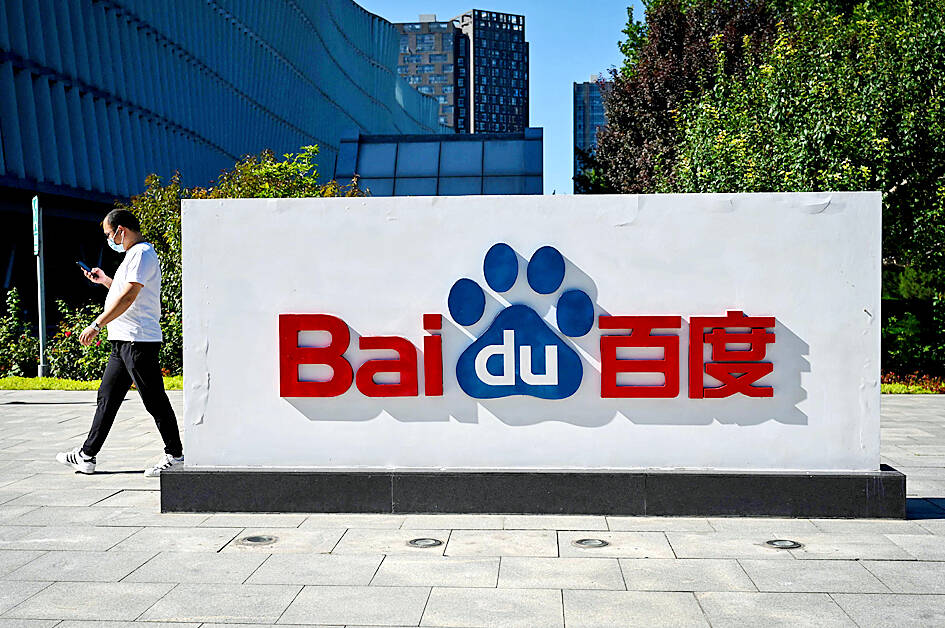Baidu Inc (百度) is planning to roll out an artificial intelligence (AI) chatbot service similar to OpenAI’s ChatGPT, a person familiar with the matter said, in what could potentially be China’s most prominent entry in a race touched off by the tech phenomenon.
China’s largest search engine company plans to debut a ChatGPT-style application in March, initially embedding it into its main search services, said the person, asking to remain unidentified discussing private information.
The tool, whose name has not been decided, would allow users to obtain conversation-style search results much like OpenAI’s popular platform.

Photo: AFP
Baidu has spent billions of dollars researching AI in a years-long effort to transition from online marketing to deeper technology. Its Ernie system — a large-scale machine-learning model that has been trained on data over several years — is to be the foundation of its upcoming ChatGPT-like tool, the person said.
A Baidu representative declined to comment.
ChatGPT, OpenAI’s artificial intelligence tool, has lit up the Internet since its public debut in November last year, amassing more than 1 million users within days and touching off a debate about the role of AI in schools, offices and homes.
Companies including Microsoft Corp are investing billions to try and develop real-world applications, while others are capitalizing on the hype to raise funds. Buzzfeed Inc’s shares more than doubled this month after it announced plans to incorporate ChatGPT in its content.
Baidu has been trying to revive growth in the mobile era, after increasingly lagging its larger rivals in arenas such as mobile advertising, video and social media. Apart from research in AI, the search giant is also developing autonomous driving technology.
Baidu CEO Robin Li (李彥宏) raised ChatGPT as an example of where the tech giant can take the lead during an internal talk last month, a transcript viewed by Bloomberg News showed.
“I’m so glad that the technology we are pondering every day can attract so many people’s attention. That’s not easy,” he said.
Commercializing generative AI by making it a “product that everyone needs” could be challenging, he said.
ChatGPT also piqued the interest of Chinese Internet users, who like people elsewhere shared screenshots of surprising conversations with the AI bot on local social media.
That is despite a heavily censored domestic Internet largely walled off from the rest of the world, a model that has helped companies like Baidu thrive as local equivalents to Alphabet Inc’s Google, Amazon.com Inc and Meta Platforms Inc’s Facebook.
Several Chinese start-ups are also exploring generative AI, and have attracted investors such as Sequoia Capital and Sinovation Ventures (創新工廠).

Taiwan’s technology protection rules prohibits Taiwan Semiconductor Manufacturing Co (TSMC, 台積電) from producing 2-nanometer chips abroad, so the company must keep its most cutting-edge technology at home, Minister of Economic Affairs J.W. Kuo (郭智輝) said yesterday. Kuo made the remarks in response to concerns that TSMC might be forced to produce advanced 2-nanometer chips at its fabs in Arizona ahead of schedule after former US president Donald Trump was re-elected as the next US president on Tuesday. “Since Taiwan has related regulations to protect its own technologies, TSMC cannot produce 2-nanometer chips overseas currently,” Kuo said at a meeting of the legislature’s

TECH WAR CONTINUES: The suspension of TSMC AI chips and GPUs would be a heavy blow to China’s chip designers and would affect its competitive edge Taiwan Semiconductor Manufacturing Co (TSMC, 台積電), the world’s biggest contract chipmaker, is reportedly to halt supply of artificial intelligence (AI) chips and graphics processing units (GPUs) made on 7-nanometer or more advanced process technologies from next week in order to comply with US Department of Commerce rules. TSMC has sent e-mails to its Chinese AI customers, informing them about the suspension starting on Monday, Chinese online news outlet Ijiwei.com (愛集微) reported yesterday. The US Department of Commerce has not formally unveiled further semiconductor measures against China yet. “TSMC does not comment on market rumors. TSMC is a law-abiding company and we are

FLEXIBLE: Taiwan can develop its own ground station equipment, and has highly competitive manufacturers and suppliers with diversified production, the MOEA said The Ministry of Economic Affairs (MOEA) yesterday disputed reports that suppliers to US-based Space Exploration Technologies Corp (SpaceX) had been asked to move production out of Taiwan. Reuters had reported on Tuesday last week that Elon Musk-owned SpaceX had asked their manufacturers to produce outside of Taiwan given geopolitical risks and that at least one Taiwanese supplier had been pushed to relocate production to Vietnam. SpaceX’s requests place a renewed focus on the contentious relationship Musk has had with Taiwan, especially after he said last year that Taiwan is an “integral part” of China, sparking sharp criticism from Taiwanese authorities. The ministry said

US President Joe Biden’s administration is racing to complete CHIPS and Science Act agreements with companies such as Intel Corp and Samsung Electronics Co, aiming to shore up one of its signature initiatives before US president-elect Donald Trump enters the White House. The US Department of Commerce has allocated more than 90 percent of the US$39 billion in grants under the act, a landmark law enacted in 2022 designed to rebuild the domestic chip industry. However, the agency has only announced one binding agreement so far. The next two months would prove critical for more than 20 companies still in the process